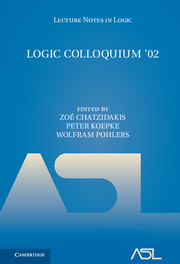Book contents
- Frontmatter
- Contents
- Preface
- Participants Photograph
- Generic absoluteness for Σ1 formulas and the continuum problem
- Axioms of generic absoluteness
- Generalised dynamic ordinals — universal measures for implicit computational complexity
- The Worm principle
- “One is a lonely number”: logic and communication
- Computable versions of the uniform boundedness theorem
- Symmetry of the universal computable function: A study of its automorphisms, homomorphisms and isomorphic embeddings
- PCF theory and Woodin cardinals
- Embedding finite lattices into the computably enumerable degrees — a status survey
- Dimension theory inside a homogeneous model
- Reals which compute little
- Bisimulation invariance and finite models
- Choice principles in constructive and classical set theories
- Ash's theorem for abstract structures
- Martin-Löf random and PA-complete sets
- Learning and computing in the limit
Preface
Published online by Cambridge University Press: 31 March 2017
- Frontmatter
- Contents
- Preface
- Participants Photograph
- Generic absoluteness for Σ1 formulas and the continuum problem
- Axioms of generic absoluteness
- Generalised dynamic ordinals — universal measures for implicit computational complexity
- The Worm principle
- “One is a lonely number”: logic and communication
- Computable versions of the uniform boundedness theorem
- Symmetry of the universal computable function: A study of its automorphisms, homomorphisms and isomorphic embeddings
- PCF theory and Woodin cardinals
- Embedding finite lattices into the computably enumerable degrees — a status survey
- Dimension theory inside a homogeneous model
- Reals which compute little
- Bisimulation invariance and finite models
- Choice principles in constructive and classical set theories
- Ash's theorem for abstract structures
- Martin-Löf random and PA-complete sets
- Learning and computing in the limit
Summary
This volume contains the joint proceedings of two major international logic meetings which took place at the University of Münster, Germany in August 2002: Logic Colloquium '02, the 2002 European Summer Meeting of the Association for Symbolic Logic and Colloquium Logicum 2002, the biannual meeting of the German Association for Mathematical Logic and the Foundations of Exact Sciences. The conferences were attended by international audiences of together more than 300 scientists from five continents, who turned Münster into a logic metropolis for 10 days from August 3 to August 12. The conferences covered all areas of contemporary mathematical logic; philosophical logic and computer science logic were presented as well. The conference programs were densely filled with invited tutorials and plenary talks, several special sessions and a large number of contributed talks. These proceedings contain elaborated and extended versions of a number of invited plenary talks and tutorials. All contributions were subjected to the refereeing standards of the Association of Symbolic Logic.
The town of Münster, located in north-western Germany, is a pleasant middle-sized administrative and university town of 280,000 residents. The city center is characterised by historic buildings, churches, squares and parks, and by an extraordinary number of bicycles on designated cycle paths. In the 1200 year history of Münster, the single most important date was the signing of the Peace of Westphalia in 1648 which marked the end of the Thirty Years War in Europe and can be seen as a very early step towards a united Europe. The University of Münster was first founded in the 18th century. It is now spread out throughout the city and has nearly 40,000 students.
Within the University ofMünster formal andmathematical logic are taught and researched at the Institute for Mathematical Logic and Foundational Research which belongs to the department of mathematics and computer science. The institute was founded and developed by Georg Heinrich Scholz who was appointed to a professorship in philosophy in 1928. The character of formal logic at Münster was shaped by Herrmann Ackermann, Justus Diller, Gisbert Hasenjager, Hans Hermes and Dieter Rodding, with an emphasis on proof theory and recursion theory. Currently the professorships for logic are held by Wolfram Pohlers and Ralf-Dieter Schindler.
- Type
- Chapter
- Information
- Logic Colloquium '02 , pp. vii - viiiPublisher: Cambridge University PressPrint publication year: 2006

